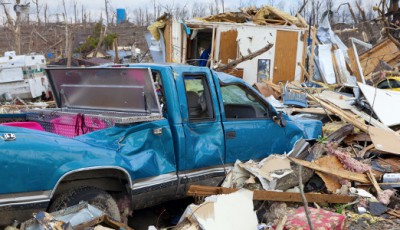Climate Change – A Clear and Present Danger

Climate-related disasters in low-income countries will deepen economic challenges, raise the risk of inter-communal conflict over scarce resources
Climate change will increasingly exacerbate risks to U.S. national security interests as the physical impacts increase and geopolitical tensions mount about the global response to the challenge.
This observation was one of the key messages in the latest Annual Threat Assessment Of The U.S. Intelligence Community.
The Threat Assessment notes the increasing physical effects of climate change also are likely to intensify or cause domestic and cross-border geopolitical flashpoints.
According to the Intelligence community, rising global temperatures and more extreme climate impacts present a growing risk of conflict over resources associated with water, arable land, and the Arctic.
Additional factors, such as mass migration, will be exacerbated by climate and weather events will intensify these risks.
Contested economic and military activities in the Arctic have the potential to increase the risk of miscalculation, notes the Threat Assessment, particularly while there are military tensions between Russia and the other seven Arctic countries following Russia’s invasion of Ukraine in early 2022.
Geopolitical tensions between countries over accelerating reductions in greenhouse gas emissions are likely to grow, as many states will compete to control resources and dominate the new technologies needed for a global transition to low-carbon energy.
Tensions also are rising between countries over climate financing. High-and middle-income countries still have not met their 2015 Paris Agreement pledges to provide $100 billion per year to low-income countries by 2020, and low-income countries want more assistance with adapting to climate effects.
The damage and human displacement in Pakistan from flooding in mid-2022 is cited as an example of why high-income countries need to pay more to low-income countries for losses they experience resulting from climate change. The same applies to Small island states threatened by rising sea levels.
Climate-related disasters in low-income countries will deepen economic challenges, raise the risk of inter-communal conflict over scarce resources, and increase the need for humanitarian and financial assistance, states the assessment.
Domestic protests, broader instability, extremist recruitment, and migration could result from the growing gap between the provision of basic needs and what governments and the international community can provide.
High-income economies will also be affected as climate change impacts global trade and strains financial systems. Droughts in 2022 decreased shipping capacity and energy generation in China, Europe, and the United States, and insured losses from catastrophes have increased by 250 percent during the past 30 years.
The Threat Assessment cites China and India as critical players in determining the trajectory of global temperature rise. They are the first and third largest emitting countries, respectively. Both are growing their total and per capita emissions, largely because they relied on cheap electricity generation from coal for economic growth and because of their efforts to appease domestic constituencies who rely on the coal industry for jobs.
Intensifying effects of climate change will exacerbate risks to human health. Rising temperatures, changing precipitation patterns, and increased frequency and severity of weather events are likely to intersect with environmental degradation, pollution, and poor water governance to exacerbate food and water insecurity, malnutrition, and the burden of disease.
Extreme heat, population pressures, and changes in rainfall because of climate change will affect agricultural and food production in many areas of the world. Illegal, unreported, and unregulated (IUU) fishing practices globally are contributing to the decline of marine fisheries—eroding food and economic security in coastal areas, particularly in Africa and Asia.
Eighty-five percent of worldwide fish stocks are fully exploited, overexploited, depleted, or recovering from depletion, according to the report, and China’s fleet of distant water fishing vessels—which often engages in IUU fishing—has contributed to overfishing more than any other nation.
The full Annual Threat Assessment is available here.



